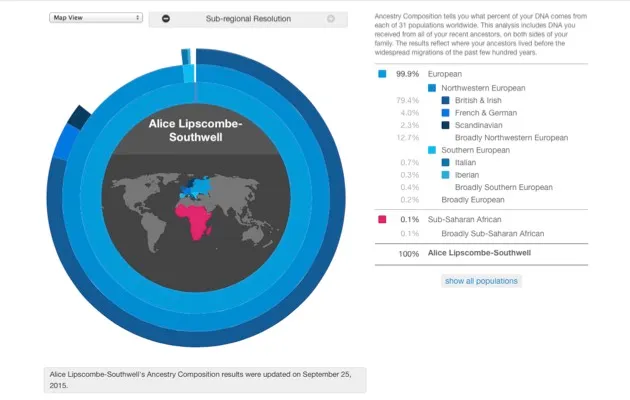Back in the September issue of BBC Focus, Michael Mosley tested out high street genetic tests. Now, Michael is a smart guy with a medical background so had no trouble understanding the results. We were interested in whether someone with no medical training would have such an easy time of it.
23andMe sent us out a sample of their genetic test, which is available to buy for £125. First off, you have to spit in a tube. Not just a little splat, we’re talking a good test tube of gob. You then pack it up and send off in the prepaid package. Note: make sure you wipe off any lipstick before the spitting commences – my sample ended up bright pink, making me look like some kind of mutant.
Then it’s the waiting game. After about six weeks I got my health and genetics data back, with the ancestry information following about a week later.
So how did they do?
I’d been hoping for some exotic ancestry data – but it turns out I’m 79.4 per cent British/Irish. You can’t really go wrong with interpreting the information as it’s presented with a pie chart-style diagram.
However, 3 per cent of my DNA comes from Neanderthals, putting me above the average European user. That’ll explain the unruly eyebrows.
Soon after I got my results back, I started getting emails pinging through from other people on 23andMe who wanted to compare genomes as they shared parts of my DNA, putting them as distant cousins. Personally, I’ve never been that interested in geneaology, but for those who like tracking their family tree, this could be a useful resource. And as it’s all based upon DNA, you don’t need to go trawling through record books. There could be some surprise relatives out there!
The other side of 23andMe lists your health overview. Scientists can look for particular DNA markers in your genome that are associated with certain diseases, traits or conditions. Helpfully, 23andMe also includes a ‘star’ rating for each test. This marks their confidence with the results. If there is plenty of established research to back it up, it’ll get a four star rating. Lower ratings mean that the research is still in its preliminary stages and more studies are needed.
On the genetic risk factors and inherited diseases front, there are a lot of conditions listed – most of which I’d never heard of – such as Alpha-1 Antitrypsin Deficiency, Familial Dysautonomia, Gaucher Disease and Familial Transthyretin (TTR) Amyloidosis. But there are also some more familiar ones such as cystic fibrosis and sickle cell anaemia.
But the biggie. On the genetic risk factors page you are given the option to check your risk of Parkinson’s, Alzheimer’s, and breast and ovarian cancer. These results are locked, so you won’t see them unless you click. As far as I know Parkinson’s and Alzheimer’s are not present in my family. But I know there is cancer. And therein lies the rub. Do you really want your risk in black and white? And what would you do about it if it came back positive (complete with four star rating)? I chose not to find out.

On a lighter note, another section lists around 40 of your traits. This is the bit I found most intriguing. I found that I have an 80 per cent chance of not being able to taste certain bitter flavours. Makes sense for this human dustbin who’ll eat anything. However, it also said that there was only a 28 per cent chance that I would have blonde hair. Erm, I am blonde. It correctly said I’d have curlier hair than average and would be lactose tolerant (thank goodness, I would die without cheese). Amusingly, it suggested that I’d make a good sprinter as I have one copy of alpha-actinin-3 in fast-twitch muscle fibre. Now I like sport, but I’m more a cycling, yoga and swimming type of girl. I can’t even coordinate myself to run, and just flail wildly.
There were some really interesting nuggets here, one of which said (admittedly with a three star rating) that I am a slow metabolizer of coffee, putting me at higher risk of heart attack when I drink it. I’ve never been able to drink it, as it leaves me shaking with heart palpitations. Another said I have an increased sensitivity to the sound of chewing (misophonia). So that’s why noisy eaters set my teeth on edge!
All in all, it’s a great test and does offer you some insight into genetics. A basic knowledge of biology would be helpful, but there is definitely no need for a PhD in order to grasp the content. It’s also worth remembering that genetics isn’t the be-all and end-all. There are other factors that can influence your health and risk factors for certain medical conditions.
My complaints are the painfully slow website and a slightly steep price. A quick straw poll in the office had people saying they’d be keener if it was a bit cheaper. And watch out for privacy settings if you’re not comfortable sharing health data!
